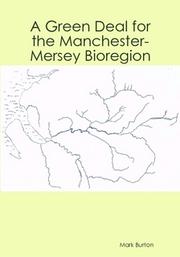
A Green Deal for the Manchester-Mersey Bioregion
By Mark Burton
Subjects: Green Deal, bioregionalism, Mersey, replacement economy, Sustainable development, Great britain, economic conditions
Description: We are living in unprecedented times. At least three linked crises are coming together to threaten not only our accustomed standard of living and financial security, but also the resource base of the late 20th century economy and way of life, and the capacity and integrity of the earth’s natural systems on which we all depend. This conjuncture of crises requires urgent and drastic action that completely restructures the way we organise to produce and distribute the things we need to have worthwhile lives This has to be done fairly and sustainably. The following outline sets out a programme of action for the Manchester-Mersey bioregion. It argues that it is the bioregional level that provides the viable basis for a sustainable economy that can deliver well being for all, despite drastically reducing energy use. But this means replacing a strategy of competition in a global economy with one based on the principle of trade subsidiarity (strategic localism) and production for need. The North West’s major city, Manchester, and the area around it has been variously identified and described as Greater Manchester, a city region and together with other areas (Lancashire, Cheshire and Merseyside) as the North West. It has been a dynamic region economically and is home to several million people (depending on where we draw the boundaries). Current economic orthodoxy sees its future development in terms of certain key sectors: advanced engineering and materials, biomedical, business and professional services, construction, creative and digital industries, energy and environmental technologies, food and drink . This all needs rethinking in the context of the triple crisis of climate change, decarbonisation/energy crunch, and the collapse of the financial / neoliberal accumulation regime. Because of the imperatives of reducing energy expenditure and (re)generating a real local economy it is at the regional level that transformative green strategies can make the most sense.
Comments
You must log in to leave comments.